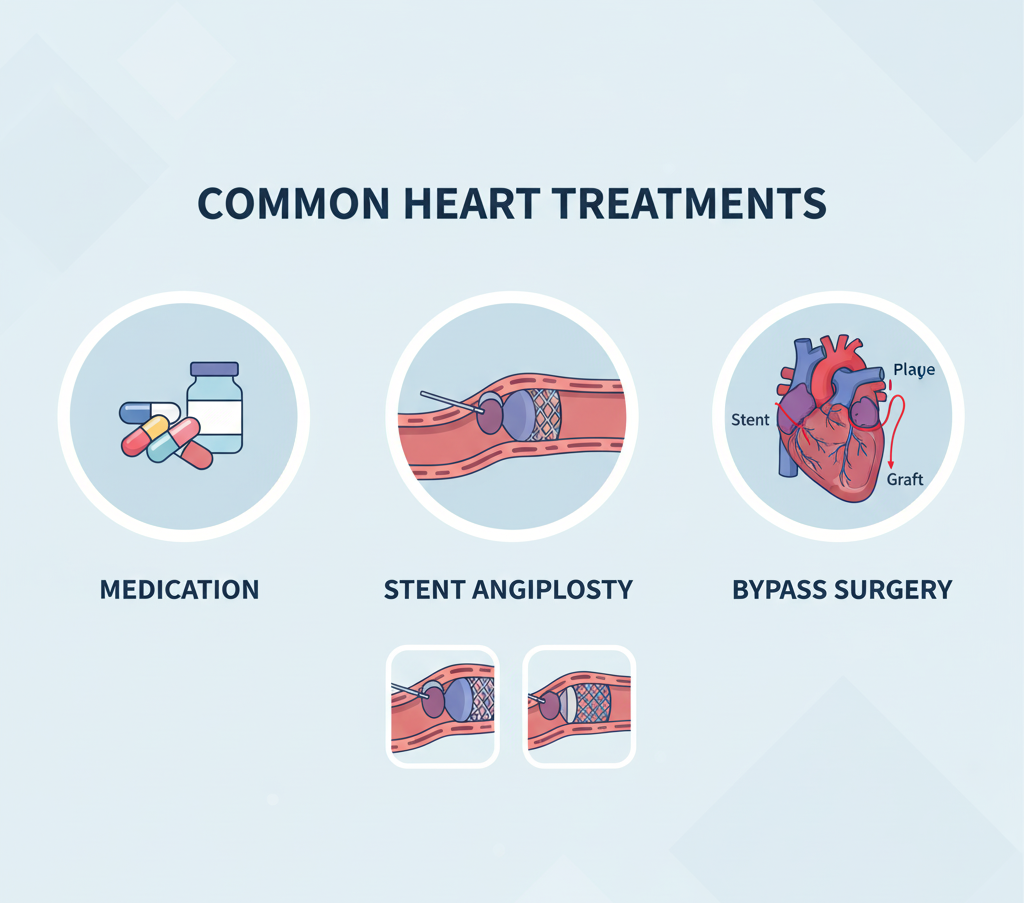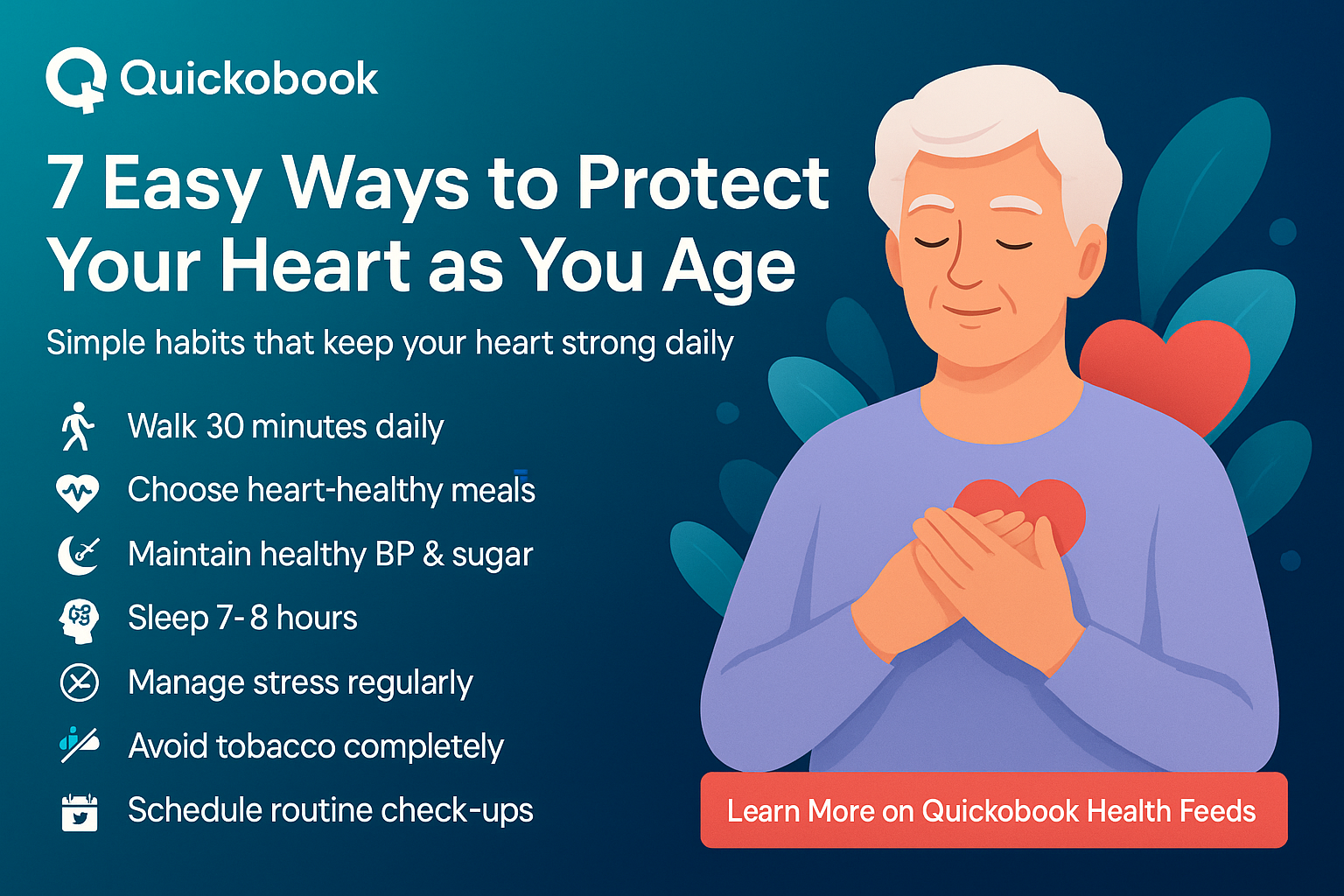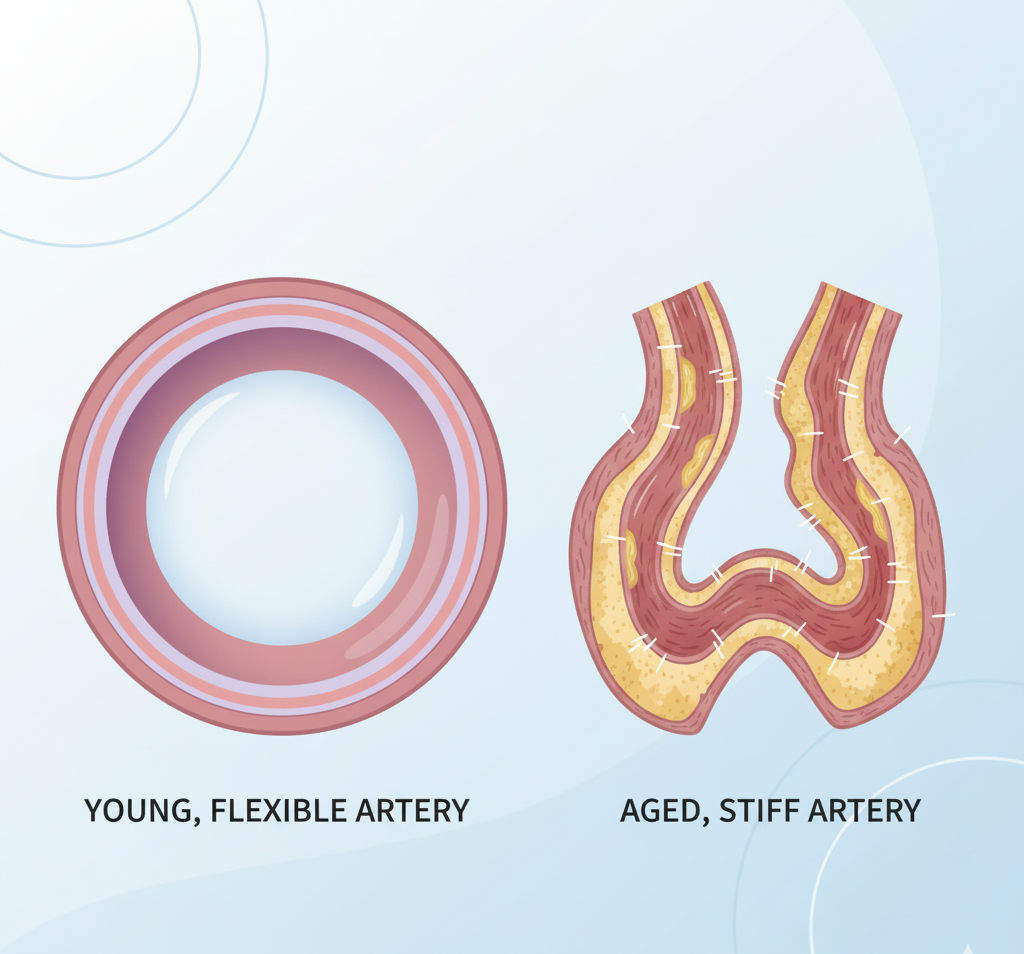Introduction
Heart health becomes even more important as we grow older. In India, heart disease remains one of the leading causes of illness, especially after the age of 40. The good news? Ageing does not automatically mean developing heart problems. With a healthy lifestyle, balanced diet, regular check-ups, and mindful daily habits, you can protect your heart and live a longer, healthier life.
This guide explains 7 easy and practical ways to improve heart health, along with causes, symptoms, diagnosis, treatment options, prevention tips, FAQs, and when to consult a cardiologist.
Understanding Heart Health as You Age
Ageing naturally affects your heart and blood vessels. Arteries may stiffen, blood pressure may rise, and cholesterol may increase. But with early action, heart disease is highly preventable.
Why Heart Health Declines With Age
-
Stiffening of arteries
-
Slower metabolism
-
Higher cholesterol levels
-
Increased risk of diabetes and hypertension
-
Reduced physical activity
-
Hormonal changes
-
Accumulated lifestyle habits (smoking, diet, stress, etc.)
7 Easy Ways to Protect Your Heart as You Age
1. Eat a Heart-Healthy Indian Diet
A balanced diet reduces blood pressure, cholesterol, and heart disease risk.
What to Include
-
Whole grains (millets, brown rice, oats)
-
Fruits & vegetables (3–5 servings/day)
-
Lentils, sprouts, paneer, tofu
-
Omega-3 sources like walnuts, flaxseeds, fish
-
Healthy oils: mustard, groundnut, olive (limited)
What to Limit
-
Deep-fried snacks
-
Ghee, butter, cream
-
Red meat
-
Excess salt (aim for <5g/day)
-
Packaged foods high in trans fats
2.Stay Physically Active
Exercise strengthens heart muscles and improves blood flow.
Recommended Activities
-
30 minutes of brisk walking
-
Jogging, cycling, swimming
-
Yoga and pranayama
-
Strength training twice weekly
Benefits
-
Lowers cholesterol
-
Reduces blood pressure
-
Helps control weight
-
Improves mood and reduces stress
3. Manage Stress Effectively
Chronic stress increases cortisol, raising the risk of heart attacks.
Simple Stress Control Methods
-
Deep breathing (5–10 minutes/day)
-
Meditation
-
Nature walks
-
Hobbies and socialising
-
Reducing screen time
4. Maintain a Healthy Weight
Excess body fat increases your risk of:
-
High BP
-
Diabetes
-
High cholesterol
-
Stroke and heart attack
Aim for a BMI between 18.5–24.9 and waist circumference <90 cm (men) and <80 cm (women).
5. Control Blood Pressure, Sugar & Cholesterol
These three conditions—often called the “silent trio”—cause major heart damage without symptoms.
Get Regular Screening
-
Blood pressure every 3 months
-
Fasting sugar & HbA1c every 6–12 months
-
Lipid profile annually
6. Quit Smoking & Limit Alcohol
Smoking damages arteries and reduces oxygen supply to the heart. Alcohol excess can cause hypertension and irregular heartbeat.
If you need help quitting, speak to a doctor for counselling and medication support.
7. Get Regular Heart Check-ups
Early detection saves lives.
Recommended Tests After Age 40
-
ECG
-
Echocardiogram
-
Lipid profile
-
TMT/Stress test (if high risk)
-
Blood pressure monitoring
-
Thyroid profile
ALSO READ: Is Keto Diet Safe? Research Reveals Serious Side Effects Of Long-term Keto Eating
Common Symptoms of Heart Problems
If you experience any of these, never ignore them:
-
Chest pain or tightness
-
Breathlessness
-
Sudden fatigue
-
Pain radiating to left arm, jaw, or back
-
Swelling in feet
-
Dizziness or fainting
Diagnosis of Heart Conditions
A cardiologist may recommend:
-
ECG
-
Echo
-
Stress test
-
Holter monitoring
-
Blood tests
-
CT angiography
-
Coronary angiogram
Treatment Options for Heart Conditions

Treatment depends on diagnosis. Common options include:
Medications
(A doctor must prescribe dosage)
-
Blood thinners
-
Cholesterol-lowering drugs
-
BP medications
-
Diabetes control drugs
Procedures
-
Angioplasty
-
Stent insertion
-
Bypass surgery
-
Pacemaker installation
Lifestyle Tips for a Healthy Heart
-
Sleep 7–8 hours
-
Reduce salt
-
Drink adequate water
-
Limit sugar
-
Eat seasonal fruits
-
Avoid late-night meals
-
Track steps (5,000–10,000/day)
Prevention: How to Protect Your Heart Long Term
-
Avoid smoking
-
Reduce stress
-
Move every hour
-
Stay hydrated
-
Go for annual check-ups
-
Maintain good mental health

When to See a Doctor
Seek medical help if you notice:
-
New or worsening chest discomfort
-
Breathlessness
-
Persistent fatigue
-
High BP not controlled with lifestyle
-
Family history of heart disease
-
Sudden palpitations
You can always book a reliable cardiologist through Quickobook for timely care.
50 FAQs About Heart Health and Healthy Lifestyle
Q1. Why does heart health decline as we age?
Aging stiffens arteries and raises BP, cholesterol, and diabetes risk.
Q2. Can heart disease be prevented after age 40?
Yes, with diet, exercise, and regular screening.
Q3. What is the best exercise for heart health?
Brisk walking is safest and most effective.
Q4. How much should adults exercise weekly?
At least 150 minutes of moderate activity.
Q5. Does Indian food harm heart health?
Not if cooked with less oil, salt, and trans fats.
Q6. Which oil is best for cooking?
Mustard, groundnut, or olive oil in moderation.
Q7. Does ghee increase cholesterol?
Excess ghee can raise LDL cholesterol.
Q8. How often should I check cholesterol levels?
Once a year after age 30.
Q9. Can stress cause heart attacks?
Yes, chronic stress increases heart risk.
Q10. Is high blood pressure dangerous?
Yes, it silently damages arteries.
Q11. How can I reduce BP naturally?
Limit salt and increase physical activity.
Q12. Can diabetes affect the heart?
Yes, it accelerates artery damage.
Q13. What is a normal resting heart rate?
60–100 beats per minute.
Q14. Is alcohol good for heart health?
No safe level is recommended.
Q15. Is honey better than sugar?
Both are sugars—use sparingly.
Q16. Can walking alone improve heart health?
Yes, if done regularly and briskly.
Q17. What foods lower cholesterol?
Oats, nuts, fruits, and pulses.
Q18. Can heart disease occur without symptoms?
Yes, many cases are silent.
Q19. Is chest pain always serious?
It should always be evaluated.
Q20. What is a heart attack?
A blockage in a coronary artery.
Q21. What is the difference between heart attack and cardiac arrest?
Attack = blockage; arrest = heart stops.
Q22. How much salt is safe per day?
Less than 5 grams.
Q23. What is good cholesterol?
HDL cholesterol protects the heart.
Q24. What is bad cholesterol?
LDL cholesterol increases blockages.
Q25. Can yoga improve heart health?
Yes, by reducing stress and BP.
Q26. Is climbing stairs good for the heart?
Yes, it’s a strong cardio exercise.
Q27. Should seniors lift weights?
Yes, with guidance for safety.
Q28. Does family history increase risk?
Yes, especially if first-degree relatives are affected.
Q29. Can women have different heart attack symptoms?
Yes, like fatigue or indigestion.
Q30. Are heart diseases common in India?
Yes, especially after age 40.
Q31. Can dehydration affect the heart?
Yes, it strains the heart.
Q32. Does poor sleep increase heart risk?
Yes, sleep is vital for heart health.
Q33. Can tea or coffee harm the heart?
Moderate intake is usually safe.
Q34. What is the DASH diet?
A diet to lower blood pressure.
Q35. Do supplements help heart health?
Only if prescribed by a doctor.
Q36. Can heart blockages reverse?
Lifestyle changes may reduce plaque growth.
Q37. Are routine ECGs necessary?
Useful for high-risk individuals.
Q38. When should I get a stress test?
If you have symptoms or risk factors.
Q39. Can obesity cause heart disease?
Yes, it increases multiple risks.
Q40. How can I reduce belly fat?
Diet, cardio, and strength training.
Q41. Can high BP exist without symptoms?
Yes, it is often silent.
Q42. Does pollution affect heart health?
Yes, it increases inflammation.
Q43. Are heart palpitations serious?
Sometimes — evaluation is needed.
Q44. What is the safest exercise for seniors?
Walking, yoga, and light strength training.
Q45. Should I avoid rice for heart health?
No, eat in moderation and prefer brown rice.
Q46. Can dehydration raise heart rate?
Yes, the heart works harder.
Q47. How to prevent heart attack naturally?
Healthy diet, exercise, and no smoking.
Q48. Is coconut oil safe for heart?
Use sparingly; it is high in saturated fats.
Q49. Can anxiety mimic heart attack symptoms?
Yes, symptoms can overlap.
Q50. What is the best age to start heart screening?
Around 30, earlier if there’s family history.
Conclusion
Heart health is in your hands. With the right habits—healthy eating, regular exercise, stress control, and routine check-ups—you can protect your heart as you age and enjoy a long, energetic, and fulfilling life.
Quickobook CTA
Need a heart check-up?
Book a trusted cardiologist on Quickobook today
Find nearby clinics, compare fees, and get confirmed appointments instantly
Consult online or in person — your choice, your convenience











Comments (0)
No comments yet. Be the first to share your thoughts!
Leave a Comment